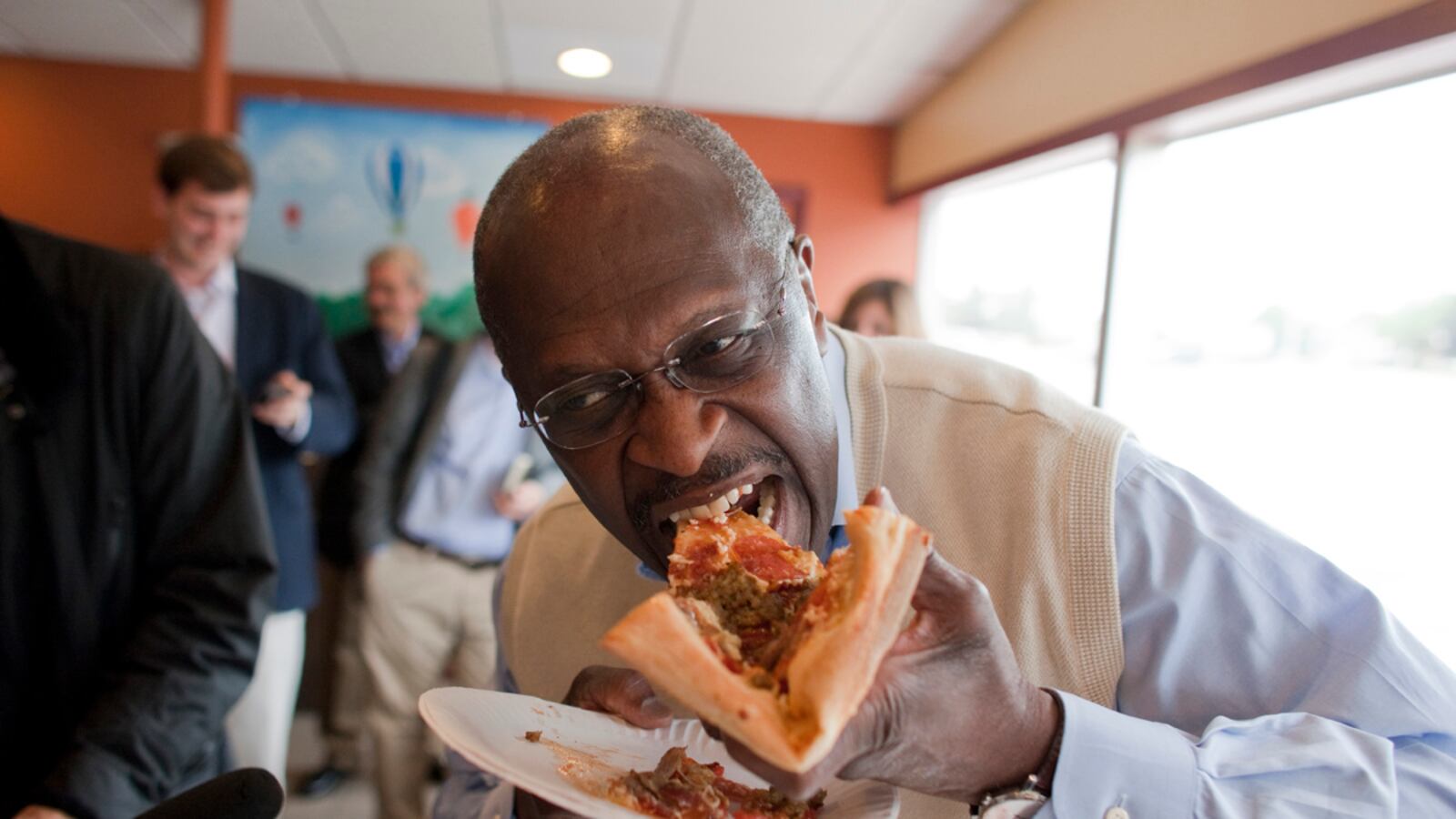Can you raise Herman Cain when he’s in defeat? The charismatic, long-shot GOP presidential contender’s name is suddenly on the lips of pundits after his upset victory in the Presidency 5 straw poll in Florida on Saturday.
After a strong start, Cain—a political newcomer whose only previous run was a failed bid for the Republican nomination for Senate in Georgia—faded quickly following Rep. Michele Bachmann’s June 27 entrance into the race. She stole much of Cain’s Tea Party fire and brimstone. Until then, he was running second only to Mitt Romney in many polls.
Whether his Florida triumph proves a last hurrah or the start of a comeback for Cain, his unorthodox background spotlights a curious phenomenon: the overwhelming conservatism of the pizza industry. Although Cain rose to business prominence with Pillsbury, working for the baking giant’s Burger King arm, his claim to fame is his time at the helm of Godfather’s Pizza, of which he served as CEO from 1986 until 1996, even buying the company from Pillsbury in 1990. Cain’s years at Godfather’s marked him deeply, and he has said the skills he learned there would serve him well as president. “The restaurant business is not capital intensive—it’s people intensive,” Cain said. “If you don’t have a keen ability to connect with people in the organization, cause people to be self-motivated, you’ve got to get people to take ownership.” On the trail, he has frequently scheduled appearances at Godfather’s restaurants, and his signature economic proposal—the 9-9-9 Plan—even sounds a bit like a popular pizza special.
Cain also has been a generous giver to political causes over the years, donating nearly $400,000 since 1979, according to FEC records. Ninety percent of that—$359,000—has gone to Republican candidates and political action committees, with another 9 percent going to industry PACs and the remainder going to a few lonely Democrats.

But other pizza moguls have similarly generous records, according to an analysis of campaign-finance records by The Daily Beast. Thomas Monaghan, the founder of Domino’s Pizza, is a staunch conservative Catholic who’s poured money into Catholic initiatives including the controversial Ave Maria University, which is paired with a planned town known as Ave Maria. But Monaghan also has put a great deal of his money into politics, donating $371,000 to Republican candidates since 1979. He’s donated $4,000 to Democrats—both recipients also have been Catholic.
The list goes on—Dan and Frank Carney, the founders of Pizza Hut, have given a combined $81,000 to Republicans over the last three decades. The trend is cross-generational, too. John Schnatter, founder of Papa John’s and young enough to be the Carneys’ son, has given $33,000 to Republican candidates, mostly in his home state of Kentucky. Even in the laid-back, arch-liberal Golden State, California Pizza Kitchen founders Richard Rosenfield and Larry Flax have each given $6,500 to Republicans—with only $500 apiece to a single Democrat, former governor Gray Davis. Little Caesar’s founder Michael Ilitch is more bipartisan: he has given nearly $118,000 to Republicans, with $67,000 going to Democrats. But many of the Democratic recipients have been either in Ilitch’s home state of Michigan or officeholders well positioned to help the gambling industry, in which he also has business interests, while many of his Republican donations have been to presidential contenders or PACs outside of Michigan.
So how did a food most commonly associated with college students and indolent marijuana smokers become a mainstay of the conservative movement?
To an extent, it mirrors dynamics in the restaurant industry as a whole. Like many large corporations, restaurant chains have a vested interest in low corporate tax rates and low labor costs, meaning they oppose traditional Democratic initiatives, such as a strong minimum wage, and support traditionally Republican ones, like lower tax rates and less regulation of business. According to numbers compiled by the Center for Responsive Politics, donations from the restaurant and beverage industry have favored Republicans for years. In addition, the National Restaurant Association—a leading trade group—has given approximately 3 to 1 to Republicans in recent cycles—actually a slight evening out from the early 2000s, when the group favored Republicans by as much as 9 to 1.
It’s no coincidence that Cain himself was CEO of the National Restaurant Association from 1996 to 1999. The restaurant business leans right, Cain says, and his top priority was to beef up its presence in politics, pouring money into its lobbying efforts and creating a special rainy-day fund for key causes. “Our goal was increasing our voice in D.C., and we achieved that,” he says.
Scott DeFife, the association’s executive vice president for policy and government affairs, said the his group’s priorities today are not necessarily the same as when Cain was in charge. “We’re always reviewing the policy priorities of the organization on a regular basis,” he said. “Our top issues this past year have ranged from immigration and interchange to health care and labor issues. Next year it might be completely different. It might be the farm bill or tax reform.”
The association says recipients of its political cash include elected officials with a strong record of backing causes important to restaurateurs, as well as candidates running against politicos with less industry-friendly records.
Like Cain, the National Restaurant Association staunchly opposed the Patient Protection and Affordable Care Act, commonly called Obamacare, which was passed in 2010. The organization does, however, support comprehensive immigration reform, an issue that has backers on both sides of the aisle. Cain does not, although he says America needs more secure borders and stricter enforcement of immigration laws.
An examination of several other fast-food moguls’ giving shows that while they, too, tend to favor Republicans, the bias is not nearly as strong as among pizza purveyors. David Thomas of Wendy’s frequently gave to Republicans, as did McDonald’s Ray Kroc, a Nixon supporter.
(Kroc’s widow, Joan, made only a single political donation during her husband’s life, but gave some $50,000 to Democrats in the four years following his death.) Only one of the restaurant barons, Chipotle founder Steve Ells, has given solely to Democrats, although nearly a third of donations by Dunkin’ Donuts CEO Robert Rosenberg veered left.
In total, The Daily Beast analyzed donations from 20 leading fast-food founders and executives from 1979 to the present. Of those, pizza moguls gave $1,151,000, of which $1,011,000 went to Republicans. Among non-pizza fast-food bosses, total donations came to only $217,000, with $143,000 going to Republicans. The numbers are plain: Republican donations among pizza-restaurant owners and executives dwarf those among other fast-food captains in both size and proportion.
Executives contacted by The Daily Beast either did not respond or declined to comment.
As to why Republicans are receiving such a big slice of Big Pizza’s pie, as it were, industry experts scratched their heads. David Corsun, a former restaurateur who now directs the Fritz Knoebel School of Hospitality Management at the University of Denver, suggested part of the reason was the size of the companies in question. Large companies such as Godfather’s, Domino’s, and Papa John’s have moved right as they have gone public, and have adopted practices similar to those of other large corporations.
“From the time that they became behemoths, they became conservative, and they’re doing what supports the bottom line,” Corsun said. “The more interesting question is the smaller operators—the people operating one, two, five restaurants—and who they support.” Corsun also suggested that the small number of data points among the biggest restaurant chains could make the political leaning appear more pronounced: a small group of extremely dedicated givers—such as Cain and Monaghan—throw the numbers off.
Cain said he felt the conservatism of pizza bosses was likely coincidence. “I think we’re just business people,” he says. “They know too much government, too much regulation, to much taxes can impede their ability to make a profit. It’s not about us being pizza people.”
That may leave the trend—like the continued popularity of Hawaiian-style pizza—unexplained for now. But for the foreseeable future, regardless of the outcome of Cain’s candidacy, it’s safe to expect that pizza moguls will continue to deliver for Republican candidates.






